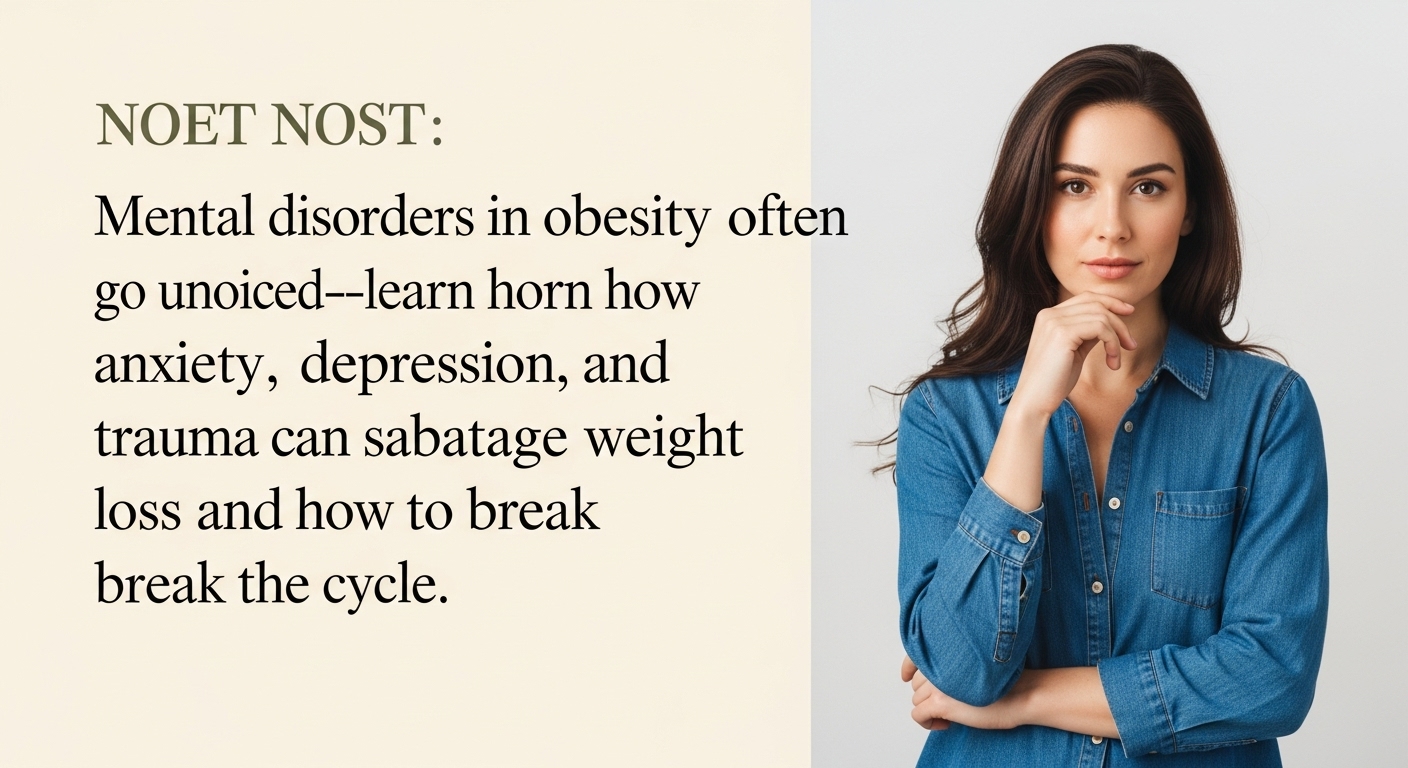The Invisible Enemy Behind the Scale
When we think about obesity, most people immediately picture poor diet, lack of exercise, or even genetics. But there’s a far more insidious force working quietly behind the scenes — mental disorders. Depression, anxiety, binge eating disorder (BED), and chronic stress aren’t just co-travelers in obesity; they’re often drivers of it. The World Health Organization (WHO) recognizes obesity as a complex, multifactorial disease — and our mental health is one of its most underestimated contributors.
In this article, we’ll explore the psychological mechanisms that trap individuals in the cycle of obesity, provide evidence-based insights, and offer concrete strategies to recognize and address these mental health challenges.
Part 1: Understanding the Psychological Triggers
1. Emotional Eating and Its Roots in Anxiety and Depression
One of the most common pathways from mental health issues to obesity is emotional eating. People often eat in response to negative emotions such as sadness, loneliness, or stress rather than hunger.
According to a 2022 study published in Obesity Reviews, individuals with depression and anxiety are 34% more likely to develop obesity compared to those without these conditions. The use of food as a coping mechanism creates a reinforcing loop, where the short-term emotional relief provided by food is followed by guilt and further emotional distress.
🔗 Obesity Reviews – Mental Health and Obesity
2. The Role of Binge Eating Disorder (BED)
Binge Eating Disorder is the most common eating disorder in the United States, affecting 3.5% of women and 2% of men. BED is characterized by recurrent episodes of eating large quantities of food, often quickly and to the point of discomfort, accompanied by feelings of loss of control and shame.
BED is highly comorbid with depression and anxiety, forming a triad that fuels ongoing weight gain and psychological deterioration.
🔗 National Eating Disorders Association – BED
3. Chronic Stress and Cortisol Overload
Cortisol, the “stress hormone,” is a double-edged sword. While it helps us manage acute threats, chronic stress keeps cortisol levels elevated, leading to increased fat storage, particularly visceral fat, which is linked to cardiovascular disease and type 2 diabetes.
Chronic stress also disrupts sleep, lowers willpower, and encourages unhealthy eating — all key contributors to obesity.
🔗 Harvard Health – Stress and Weight Gain
Part 2: The Biochemical Sabotage
4. Brain Chemistry and Dopamine Dysregulation
Dopamine is the brain’s “reward” chemical. In individuals with depression or ADHD, dopaminergic pathways can be impaired, leading them to seek pleasure through external sources — often high-fat, high-sugar foods.
A 2019 study in Translational Psychiatry found that obese individuals have a blunted dopamine response, making it harder to feel pleasure from normal activities and increasing reliance on food for emotional regulation.
🔗 Translational Psychiatry – Obesity and Dopamine
5. The Vicious Cycle: Sleep Deprivation and Mental Distress
Poor sleep, often linked to anxiety and depression, increases ghrelin (hunger hormone) and decreases leptin (satiety hormone), resulting in increased appetite and cravings. Add fatigue-induced decision fatigue, and you have a perfect recipe for poor dietary choices.
🔗 Sleep Foundation – Sleep and Obesity
Part 3: Clinical Implications and Real-Life Impact
6. Barriers to Treatment
People with obesity and comorbid mental health conditions often face dual stigma: fatphobia and mental health stigma. This leads to low self-esteem, avoidance of medical care, and underdiagnosis of both issues.
Moreover, healthcare providers may focus on weight loss without addressing underlying psychological issues, resulting in poor outcomes and frustration.
7. Medications and Their Side Effects
Several medications used to treat mental health disorders — especially antipsychotics, antidepressants, and mood stabilizers — can cause significant weight gain. This is particularly true for medications like olanzapine or certain SSRIs.
🔗 NIH – Psychiatric Medications and Weight Gain
Part 4: Solutions That Work
8. Integrated Care: A Dual Approach
To effectively treat obesity in patients with comorbid mental health conditions, an integrated approach is essential. This means simultaneous treatment of both mental health and weight, using cognitive-behavioral therapy (CBT), nutrition counseling, and, when appropriate, pharmacotherapy.
🔗 CDC – Obesity and Mental Health
9. Mindfulness-Based Interventions
Mindfulness, meditation, and stress-reduction techniques can help rewire the brain’s response to food and stress, promoting self-awareness and reducing emotional eating.
🔗 NIH – Mindfulness and Eating Behavior
10. Behavioral Activation and Lifestyle Coaching
Behavioral Activation, a form of CBT, focuses on increasing engagement in positively reinforcing activities to combat depression and anxiety. Combined with coaching in healthy eating, exercise, and sleep hygiene, it can empower individuals to take control of their health.
Conclusion: A Call for Compassionate Awareness
The link between mental disorders and obesity is not just a side note — it’s a central piece of the puzzle. When we start treating obesity not as a failure of willpower, but as a condition rooted in complex psychological and physiological mechanisms, we open the door to more compassionate, effective, and sustainable solutions.
If you or someone you love struggles with both mental health and weight, remember: you’re not lazy. You’re not broken. You’re human — and help is available.

